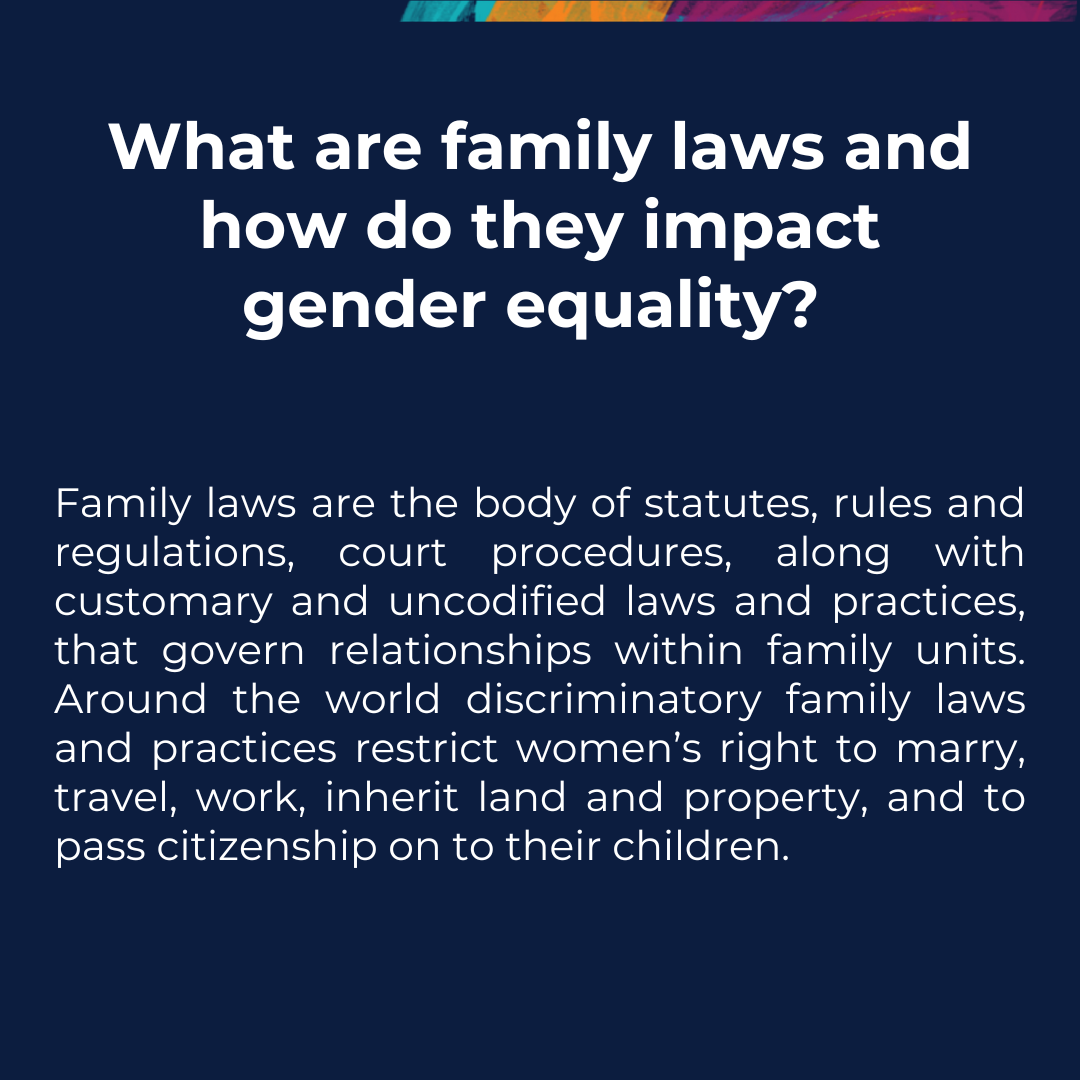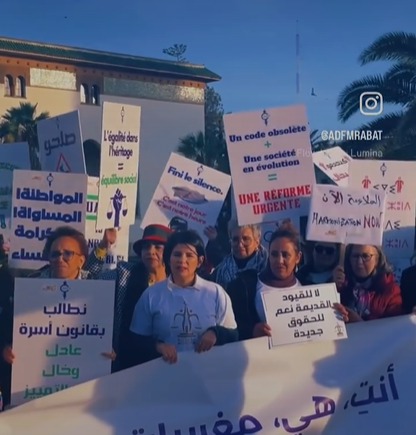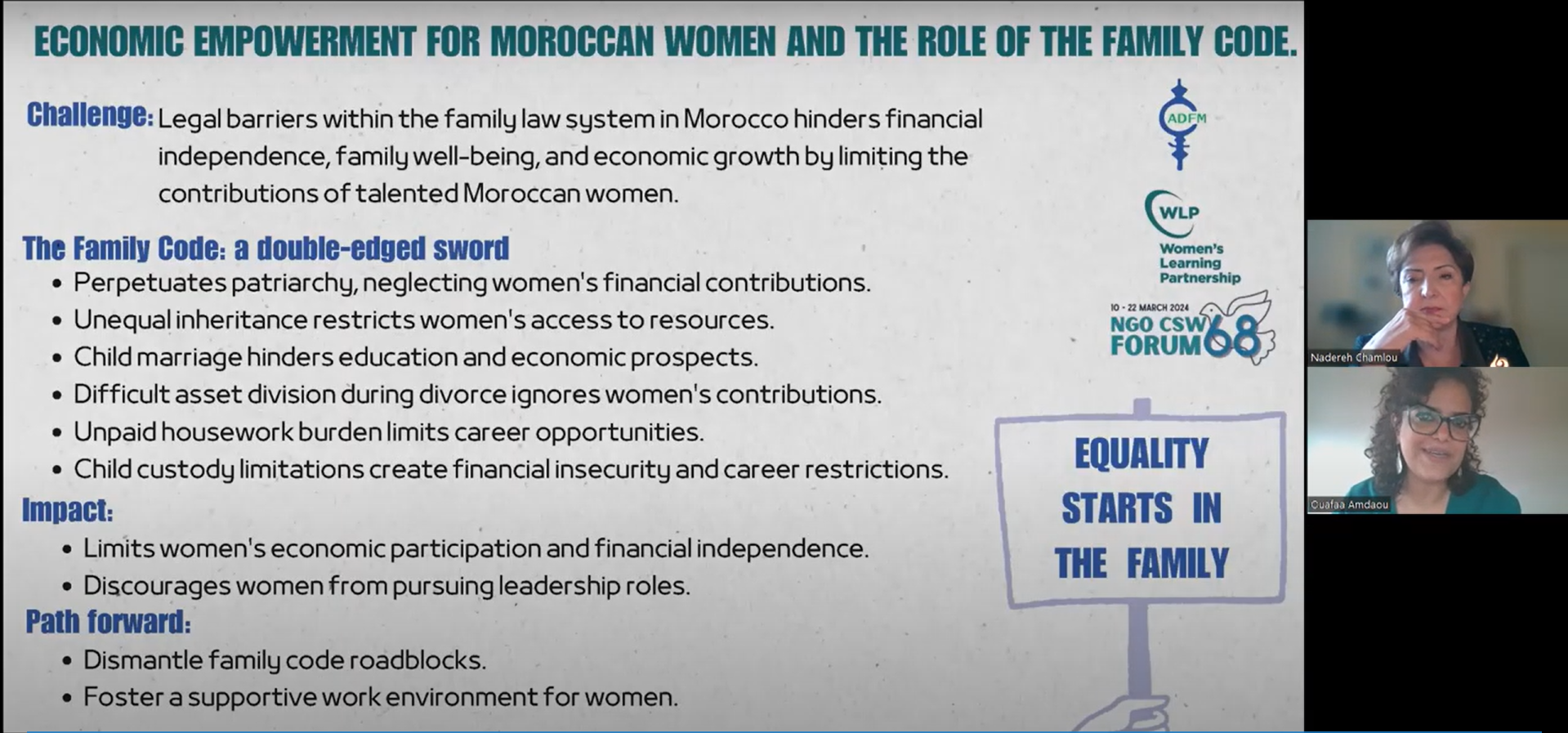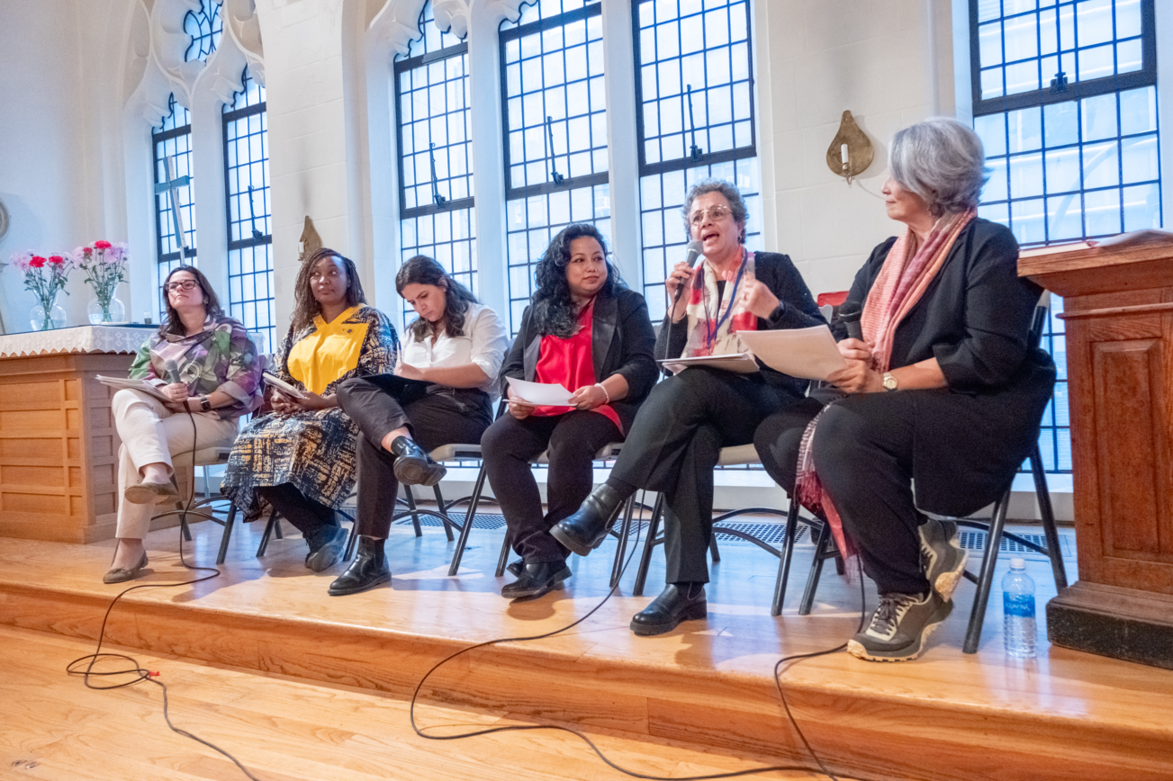
In 2004, after decades of advocacy by women’s and human rights groups, Morocco’s Parliament adopted a new Family Code, called the Moudawana. The 2004 Moudawana reform was considered one of the most important family law reforms for women’s rights in the MENA region. The legislation recognized women’s right to self-guardianship, child custody, and raised the legal age of marriage.
Despite the reform two decades ago, laws that limit women’s rights and agency in the family and in society remain. These include unequal access to inheritance, allowances for child marriage, unequal distribution of assets after divorce, and child custody limitations. Now, after nearly two decades of activism by women’s rights organizations, Morocco’s government is revisiting the Family Code. In September 2023, King Mohammed VI instructed the head of the government to appoint a committee that would draft a revised Family Code. The committee included the Ministry of Justice, the Supreme Council of the Judicial Power, and the Public Prosecutor Office, and coordinated with the High Council of Religious Scholars (Oulema), the National Council for Human Rights, and the governmental authority in charge of solidarity, social integration, and family affairs, in consultations with civil society organizations, researchers, and experts. The committee was given a six-month deadline for the drafting and consultation process.

In March 2024, as the deadline neared, Moroccan women’s rights organizations attended the 68th Commission on the Status of Women (CSW68) to mobilize support for reforms that close the remaining gaps in Morocco’s Family Code that perpetuate gender discrimination.
Making the link between discriminatory family laws and women’s economic security
This year’s CSW centered around accelerating gender equality by addressing poverty and advancing women’s economic rights. At a parallel event hosted by Women’s Learning Partnership, Ouafaa Amadou, Program Coordinator for Democratic Association of Moroccan Women (ADFM), made the linkages between discrimination in the Family Code and women’s economic insecurity in the country. “In Morocco’s Family Code, daughters are only given half of the rate of inheritance as sons. This creates an immediate financial gap between women and men….Of the 32,000 requests for early marriages, eighty-one percent were approved. Girls forced into early marriages often lack opportunities to continue their education and prepare themselves for careers. These are just a few ways that the family code perpetuates women’s economic insecurity.”
Morocco, like many countries around the world, does not have social safety nets or economic systems that account for women’s unpaid labor and contribution to the household. In many cases, this can lead to early and forced marriage for women and girls without economic opportunities or security. In addition to inheritance laws and allowances for early marriage, the Family Code also limits women’s access to equitable division of assets during divorce.

“The division of assets during a divorce is a nightmare for women. Their contribution to the household including the financial management all goes unrecognized in the division of assets. The law fails to recognize this labor and perpetuates an unfair system,” explains Amadou.
At the conclusion of WLP’s event, attended by representatives from 31 civil society organizations from 19 countries, Amdaou called on the international community to support the national effort for reform. “Reforming the Family Code, and in doing so empowering women economically, is not just a matter of gender equality and justice. It is a matter of survival and resilience in the face of unprecedented global challenges.
Crossing borders and boundaries to advance the Family Code reform
At a CSW68 side event hosted by the Global Campaign for Equality in Family Law, international policymakers, government officials, and human rights leaders heard from a panel of experts about why family law reform is a cornerstone to gender equality and how organizations are achieving reform.

Photo Credit: Simon Chambers/ACT
At the event ADFM Board Member Nezha Belkachla explained how Moroccan organizations are using research to make the case for gender equal family laws and working with religious leaders to promote productive dialogue around culture, rights, and reform. “Feminist movements are working with religious scholars to conduct research that shows how women’s equality in the family is in line with the goals of Islam. Both are concerned with justice, equity, and equality.”
In Morocco, social media debates around the reforms have surged and groups opposed to the efforts by women’s rights organizations are using online platforms to spread misinformation about the reform recommendations from women’s CSOs. Belkachla discussed how youth connected to CSOs like ADFM have mobilized to combat misinformation, and share facts and stories about how the Family Code has impacted women and families. “There is a rise of a young generation of feminists and they use social media creatively and effectively to support calls for equality and political reforms. And these demands are in line with Morocco's development goals, commitments to gender equality, and its recognition of the place and role of women in the economy and society.”
In her closing remarks Belkachla encouraged international policymakers to work with activists and civil society to reform discriminatory family laws and advance gender equality and human rights. “There is an opportunity [for the international community] to advocate for rights and hold states more accountable to their commitments to human rights, not only in Morocco, but around the world. This type of accountability can be done through sustained monitoring and collaboration with national civil society organizations.”
Where does the Family Code reform stand now?
On March 30, the committee responsible for reviewing the Family Code submitted their proposal to Morocco's Head of Government. The proposal was then given to the office of the King for review. After the King reviews the proposal it will be sent to parliament for further deliberation and to move through the parliamentary system. There has been no public information available yet about the official contents of the proposal but those who support the Family Code reform remain hopeful.
In a recent conversation with WLP, Ouafaa Amdaou explained why gender equality advocates are optimistic about the reform process. "The ongoing reform of family law in Morocco signifies a crucial step towards fostering gender equality and promoting the rights and well-being of individuals and families. While the final version is yet to be realized, we believe that the commitment to this process reflects a progressive and inclusive approach to addressing societal needs and aspirations."
Update 6/7/2024:
In June, after reviewing proposed reforms to the Moroccan Family Code, King Mohammed VI referred the document to the High Council of Ulemas. In his referral he instructed the High Council to examine the proposed changes and issue a fatwa on their alignment with the principles of Islam. A coalition of women’s rights organizations in Morocco, including WLP’s partner ADFM, has issued a press release that encourages the High Council of Ulemas to consider the current economic and social realities of Moroccan women today and the principle of equality between men and women stipulated in the country’s constitution, as they review the proposed changes to the Family Code. Read the full statement in Arabic here.
Related Content
The Scariest Part of this Halloween? The Rise of Authoritarianism Haunting the World
As Halloween fills the streets with goblins, ghosts, and witches, an even more sinister specter looms on the global stage—the surge of authoritarianism. This season, the chills don’t come from haunted houses but from a dangerous trend sweeping across nations, threatening freedoms, human rights, and especially women’s rights.
Transforming Communities in Afghanistan by Investing in Women and Girls: A Conversation with Zala Ahmad
This International Day of the Girl, WLP had the honor of speaking with Zala Ahmad, advisor to WLP's Cross Border Coalitions Initiative and co-founder of Safe Path Prosperity (SPP), an incredible organization dedicated to empowering Afghan women and girls through menstrual health education and access to essential products. Operated by Afghan women, SPP produces Safepad, a locally-made reusable sanitary product, in production centers located in Kabul and Kandahar. The organization is dedicated to creating pathways to employment, prosperity, and dignity for Afghan women and girls through various initiatives, including employment opportunities, mental health support, and educational awareness programs. To date, SPP has generated over 100 jobs and distributed more than 250,000 hygiene kits to women and girls across Afghanistan. In this interview, we delve into the work of Safe Path Prosperity and the organization's vision for women's empowerment in Afghanistan. Read more about the inspirational work of SPP below.